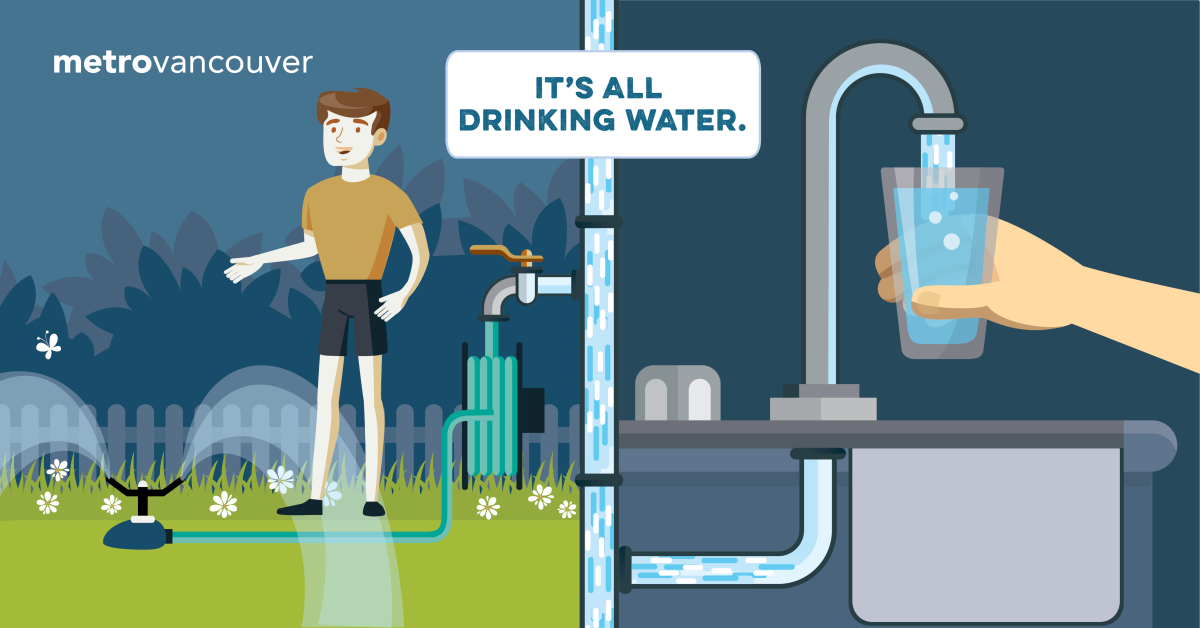Summer’s approach means exciting things for the Metro Vancouver region: longer days, warmer nights, and everything in full bloom. But with the rising temperatures comes an increase in water usage for outdoor chores like gardening and washing your car.

Metro Vancouver’s water comes from rainfall and snowmelt in the mountainous watersheds in the northern part of the region. The reservoirs are replenished with rainfall, but in the drier months of the summer personal usage is up and water levels begin to drop, which affects the region’s drinking water supply. That’s where conservation comes in.
For Metro Vancouverites, who use a daily average of 270 litres per person in their homes, outdoor water use in summer contributes to a 50% increase in consumption. According to the Government of Canada, our country “remains one of the largest per capita users of freshwater in the world.” There are simple things any Metro Vancouver resident can do to curb that usage and have a meaningful impact.
Brian Minter has been a garden communicator for over 50 years. The entrepreneur, who started the world-famous Minter Gardens store with his wife Faye in 1977, is B.C.’s “go-to garden expert,” writing columns, and appearing on radio and television to talk about all things fauna—though he admits he’s still learning more about gardening and the environment all the time.
“It’s a learning process for us as well,” he says. “In the gardening industry, we’re all thinking conservation.” Minter, who continues to run the family business with his wife and two daughters, Lisa and Erin, is seeing trends like an increased interest in heat-loving perennials and succulents, which aren’t as reliant on water.
But that’s just one of Minter’s many tips on how to save H20. Here are some others.
Preparation goes a long way

Get breaking National news
Preparing the soil for your lawn and your garden beds can set you up for a more effective season of watering, making less water go a long way. Choosing a soil rich with organic material will improve its moisture-retaining abilities, and will help your roots grow down deeper, making your plants more self-sustaining. Getting the right tools can also make a difference. Minter suggests 1,000-hole water breakers for your hose nozzle because it “distributes the water more evenly.” Drip systems for container gardening helps water right to the roots as well, where moisture is needed the most.
Use timing to your advantage
Though it can be a pain to get up early, watering in the morning is more effective. The earlier you water, the less is lost to evaporation, and the more moisture the plants or grass retains. “We often surface-water,” says Minter, who suggests watering less frequently, but longer and more deeply when you do—once a week for an hour is all it takes. “You have to water enough that the water penetrates down deep,” he says. That way, the water you use doesn’t just evaporate before it nourishes the plant. Metro Vancouver’s Drinking Water Conservation Plan is also in effect between May 1 and October 15, so watering between 4 a.m. and 9 a.m. is both more effective and complies with the regulations.
Don’t worry so much
When the months are drier, your lawn might go from a lush green to something a little less lively. It’s easy to want to try and fix that by adding extra watering to your schedule, but there’s something to be said for a little patience. “Lawns do go brown during the summer,” notes Minter. “They will recover, don’t be afraid.” Same with your dirty car. Instead of letting your hose run while you shine up your vehicle, use a bucket of water and focus on the safety spots—front and rear windows, and headlights.
Take advantage of the region’s weather
While the wetter seasons can pose challenges, the advantage to all the rain the region sees is the ability to collect it. “Rain barrels are selling really, really well because people understand the importance of collecting rainwater,” says Minter. Using treated drinking water isn’t the only way to feed your plants or clean your driveway. Having an extra water source can be beneficial for anything from wiping down your windows, to watering your vegetables, which love warm rainwater anyway.
Know when water is worth using
For more easy tips on using less water outdoors this summer, visit welovewater.ca


